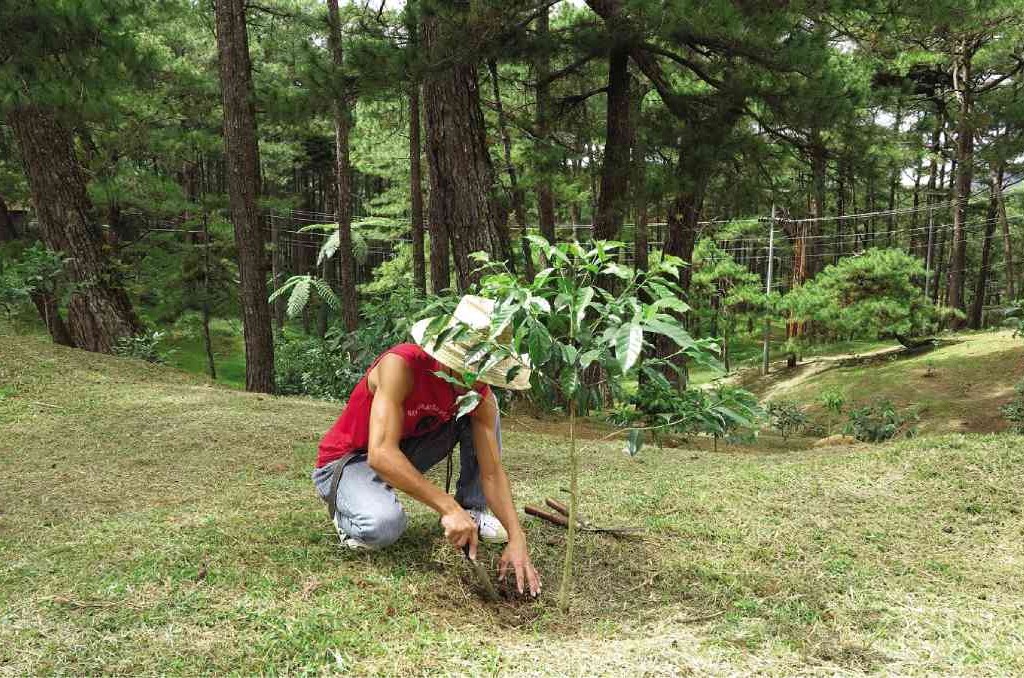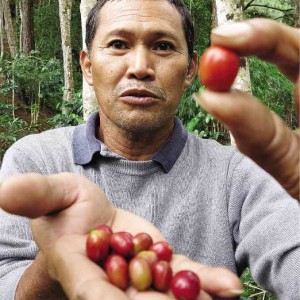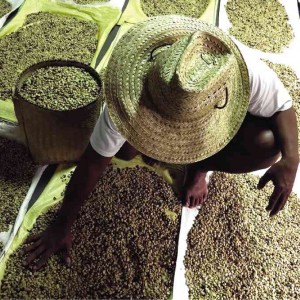Farmers urged to be part of coffee value chain

PLANTED in Aug. 21, 2013 beneath the pine canopy of Camp John Hay, 67,000 arabica coffee trees of Rocky Mountain Cafe currently thrive in Baguio City. The beans are insured against extreme weather. PHOTOS BY EV ESPIRITU/INQUIRER NORTHERN LUZON
BAGUIO CITY—The local coffee industry has often been vulnerable to erratic pricing and low supply, but big and small players agreed at a recent conference here that there was no other way to go but up.
Pierre Yves Cote, director of Rocky Mountain Arabica Coffee Co., a leading producer and exporter of Arabica coffee, said the Philippines has slid from being a major coffee producer to a coffee importer just as a sophisticated coffee culture took root among urban or urbanizing communities.
“The Philippines went from No. 3 down to No. 27 in world production, and from net exporter to a new importer,” Cote said when he addressed coffee traders and farmers here on Nov. 5.
“There is no real industry, all farmers are into backyard farming. Ninety-seven percent of coffee farming in the Philippines is done by small farmers who have no access to capital, technology and market,” he said.
A turnabout is possible if farmers themselves become part of the value chain.
Alvira Reyes, treasurer of the Philippine Coffee Alliance (PCA), said coffee farmers may evolve from simply being commodity suppliers by becoming coffee entrepreneurs who have a hand in all aspects of the profit chain from the “seedling to the brewed coffee cup.”
Picture a farmer who supplies beans to his own coffee shop, she said.
“The farmers can start small. There is no need to go big first. As one of our speakers said, coffee is a patient industry,” she said.
Cote said the domestic coffee market has been opened but because of a supply problem, the importation of coffee beans has increased by 20 percent in the last five years.
The large bulk of imported coffee has been for the so-called “3-in-1” instant coffee consumers, he said.
Instant coffee manufacturers make up 95 percent of the import demand. Top instant coffee producers are Nescafé Philippines, Universal Robina Corp. and Commonwealth Foods Inc.

ARIEL Macapagat, plantation manager of Rocky Mountain Cafe in Bektey, La Trinidad, shows a newly harvest arabica coffee beans.
Cote said the Philippines should develop 13,000 hectares of land for coffee production a year in the next five years and 20,000 ha. a year in the next 20 years to match the demand now being fulfilled by imports.
“[An amount] of P77 billion in five years is needed to be invested in nurseries, seedlings, fertilizers and plantations, to substitute imports,” Cote said.
He said Rocky Mountain has been developing its own coffee mill and 20 plantations in the country. The company maintains a small plantation beneath the pine canopies of Camp John Hay here.
Cote said his firm supplies quality-grade coffee to 200 supermarkets and 150 hotels and restaurants in the Philippines, Canada and the US.
Rocky Mountain set up its first plantation in Tuba town in Benguet province in 2009.

ARABICA coffee beans are sorted at a drying storeroom in Barangay Bektey, La Trinidad town in Benguet
Clarence Baguilat, Cordillera director of the Department of Environment and Natural Resources, also announced at the conference that the national greening program counts coffee among the tree varieties that the government has identified for the program.
The program requires government to plant and nurture 1.5 million trees in 1.5 million hectares of land within the six-year term of President Aquino.
Baguilat said the DENR has reserved 9,000 hectares of land in the Cordillera for coffee plantations.
“If you are going to grow coffee, you have to love coffee. If we cannot increase the volume of coffee yet, we can increase its value or quality,” said Pacita Juan, chair of the Philippine Coffee Board.














